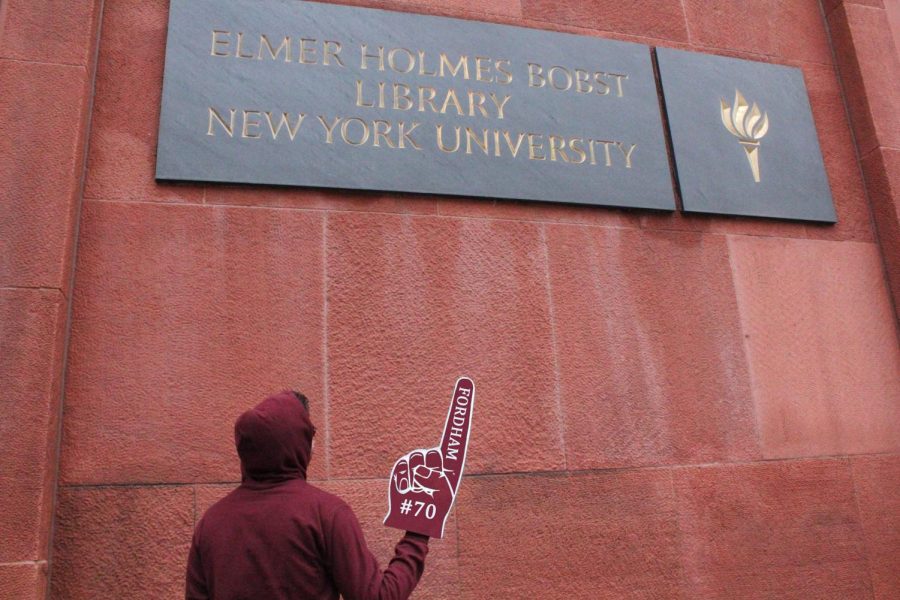Do Fordham Students Care About Rankings?
PHOTO ILLUSTRATION BY NAZLI ARDITI
Students often lament Fordham’s ranking compared to other NYC schools.
March 11, 2019
Fordham University’s position on college rankings has been unclear up to this point: University President Rev. Joseph M. McShane, S.J., has written statements both criticizing the notion of these lists and asking the community to improve Fordham’s position in them. For the most part, though, college students find these ranking systems relatively insignificant.
For prospective students, the U.S. News & World Report national university list seems to take precedence over other lists. Many view the list at least once, especially when speaking to parents and high school guidance counselors. McShane sends an annual email to the university community wherein he reacts to the school’s new position. The change, of late, has shown a downward trend: Fordham was 60th on the list of universities in 2017, 61st in 2018 and 70th in 2019.
Several students have indicated that the U.S. News list does not live up to the hype surrounding it. One of those students was Kylie Ford, Fordham College at Lincoln Center (FCLC) ’20 and a philosophy and math double major, who relied more on other metrics when making her college choice.
“Fordham had a good reputation at my high school,” Ford said, “and I cared more about financial aid and scholarships than ranking.”
Sophia Oliveri, FCLC ’20 and a film and television major, is in the same camp. “I don’t think they are very accurate,” she said. “I think that college is more about the individual. What makes a university the best for one person may not be why one is best for someone else.”
“They did, however, matter to my parents,” Oliveri added. “I can only assume that it was about them wanting me to go to a good school and get the best education to have a good future … Rankings always mattered to my mom specifically, but I think that might be a competitive mom thing because I think she wanted bragging rights.”
As for Adina Redzic, Gabelli School of Business ’20, she is averse to the idea of rankings altogether and has rarely ever looked at them. “I’m a strong believer that the way to build a reputation is by focusing on your community,” she said. “These ranking systems normally pivot our attention outward and force us to make comparisons of ourselves with other schools, but never realign our focus to ask, ‘What can we, as Fordham students, do better to build the reputation and value of our school?’”
The anti-rankings sentiment was not a universal one, though. Kellan Stanner, FCLC ’20 and an environmental studies and urban studies double major, is ambivalent on the issue. “The rankings matter to me in the sense that I know they matter to many people,” he said. “They’re a powerful factor in the decision of many students unfamiliar with Fordham in any other way, and I think we should strive to make as good a first impression as we can.”
On the other hand, he rejects the idea that a position on a list is not a holistic methodology for a student’s school choice. “Ultimately, I think it comes down to fit,” he said, “which is obviously not reflected in a numeric list based on purely quantitative data.”
Meanwhile, Lis Ortiz, FCLC ’20 and a psychology major, acknowledged that they feel the U.S. News list holds some weight. “Fordham’s placement on the best universities list matters to me,” they said, “solely because we have been conditioned to place greater emphasis on the name of the institution instead of on the fact that we are pursuing higher level education, which is most important.”
Bob Howe, assistant vice president for communications at Fordham and special adviser to McShane, emphasized that the soundness of ranking lists is based on their methodologies, if they have any at all. “Most rankings reflect institutional wealth,” he said. “Larger endowments correlate with higher rankings.”
Speaking on behalf of “McShane and the rest of the institution,” Howe added that “there is considerable debate regarding most, if not all, of the ranking schemes for universities.” He went on to question their validity: “Do they really measure the quality of an institution? Statistically, large changes in institutions’ rankings are suspect.”
But the U.S. News list is not the only one that matters to the Fordham community. The Foundation for Individual Rights in Education (FIRE), which identifies itself as “a nonprofit educational foundation based in Philadelphia” on its website, releases a yearly list of the 10 worst colleges for free speech in a nonspecific order. Fordham made the cut in 2017 and 2018 but avoided inclusion in 2019.
This register appears to matter more than the U.S. News list to Fordham students, including Redzic. “This is the one ranking that concerns me the most about Fordham,” she said. “Free speech is the way to air out bulls–t. When we have open dialogue about x subject matter, the exchange of ideas eventually stumps illogical fallacies.”
“As a university, a supposed breeding ground for free thinking,” she continued, “we need to be more conscious of engaging in respectful conversation.”
Ortiz said that even though they expected the FIRE inclusions, they do concern them. “Fordham’s placement on the FIRE’s Worst Colleges for Free Speech does not surprise me at all,” they said. “Though the university prides themselves on being inclusive for a Jesuit university, at the end of the day it is still a Catholic university, embracing and enacting some of the less accepting Catholic ideologies.”
Stanner, however, is skeptical of the FIRE list. He explained that he questions the group’s methods for deciding what is a violation of free speech and what is not.
“On one hand, I think the university has totally mishandled the organizing efforts by Students for Justice in Palestine,” he said. “But on the other, FIRE seems pretty reactionary in what qualifies invasions of freedom. Their website cites a passage of the handbook policy prohibiting threatening or harassing emails as a red flag.”
“The university has issues with speech, but not for the reasons FIRE seems to think we do,” he said.
As for why FIRE excluded Fordham from its 2019 iteration of the list, Nico Perrino, the director of communications for the organization, said that the past year has simply been better for the university than the previous two.
“Fordham did not appear on this list because their worst actions occurred mostly in previous years, and our annual list tends to focus on actions within the past 12 months,” Perrino stated. “Just because a school doesn’t appear on one of our annual lists does not mean that school is protecting students’ free speech rights.”
Fordham is still listed as a “red light university” on FIRE’s website, though. The foundation defines a “red light” institution as one that has at least one policy that both clearly and substantially restricts freedom of speech.
“Not making the cut this year does not amount to a step forward,” Perrino said. “Fordham’s just standing still.”
All students interviewed by The Observer stated that no third-party rankings or lists influenced their decisions to attend Fordham. They listed other factors, like academic reputation, program availability, scholarship offerings and location as holding more weight.
“I chose the school and the program I thought I would enjoy and benefit from the most,” Oliveri said. “I did look at the list, but I thought Fordham was right for me so it didn’t affect my decision in any way. I don’t even remember what the ranking was.”
“I wanted to go to a Jesuit school and I wanted to be in New York,” Stanner said. “My decision kind of made itself.”













